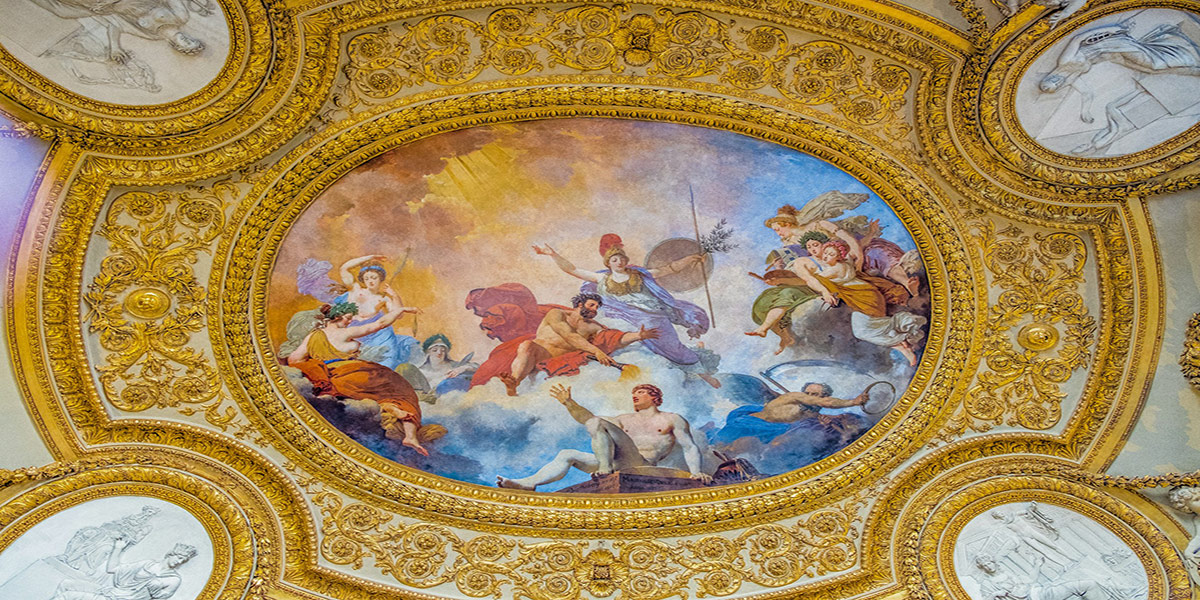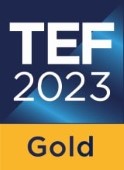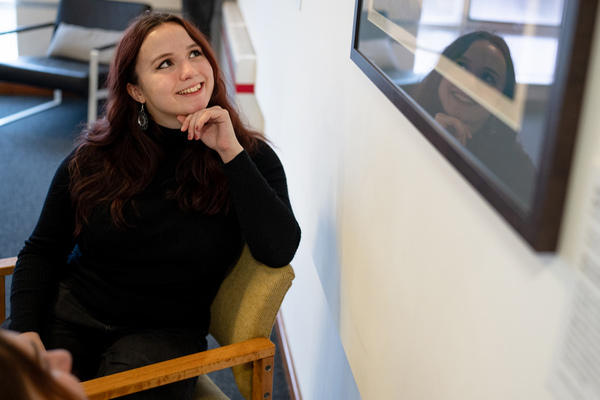
Discover the history of art and architecture. Delve into the study of French and francophone culture.
Year of entry: 2025/26
V3R1
Y50
4 years full-time
AAB (full entry requirements)
September 2025 (semester dates)
Book your place for our Open Days on Saturday 21 and Sunday 22 June 2025.
Book your placeStudy cultural heritage, from the history of art and architecture to French and francophone culture. Spend a year abroad and discover new ways of viewing the world.
At York, you can choose:
Gain an exciting and fresh perspective on the history of human expression through studying art and French, graduating with skills highly prized by employers across a wide range of industries. You'll explore an extraordinary variety of art and architecture, covering a wide range of time periods and cultures - from north Africa to contemporary digital culture. By studying French alongside art history, you'll have a deeper understanding of art collections around the globe, particularly those in French and francophone culture
We have a distinctive approach to studying languages. From the start, you'll be taught in the language you are learning. Our expert staff, many of whom are first language speakers, will support you to develop your fluency and communication skills rapidly. If you choose a language as a beginner (ab initio), you’ll join post-A level students in your second year. You’ll be amazed how much you can achieve.
You’ll join a vibrant modern languages and history of art community, with regular academic and community events and talks. We’re both highly international departments, and have excellent partnerships with other universities and organisations which you can work with during your year abroad.
If you want to extend your language learning even further, you can choose elective modules from a wide range of languages, global cultures, and historical periods or take extracurricular classes as part of our Languages for All programme.
Instead of a history of art option, you can choose to take a TEFL module in Year 2 or Year 3. These options will count towards a TEFL qualification, which can qualify you to teach English to non-native speakers.
You'll benefit from strong industry links throughout your degree.
You'll be taught by expert art historians, many of whom are curators with international reputations. During your degree, you'll study engaging modules from the late antique to the contemporary. You'll also be able to learn a language, enhancing your experience and understanding of art history and benefiting your career.
Studying French will combine an in-depth study of cultural and social phenomena, including their transnational and diasporic manifestations, with the development of high-level communication skills.
You’ll go abroad in your third year. You can choose a work placement, internship or studying at one of our partner universities. Our internship students have been to a wide range of organisations including in schools, the heritage sector, the media, translation, marketing and finance sectors around the world. Your plans will be supported by our departmental year abroad coordinators.
Study French from scratch
You can choose to study French ab initio, meaning you don't need to have any knowledge of the language before you arrive. You'll study with other ab initio students during your first year, and will focus on improving your language skills, before joining the post-A level students during your second year.
There are opportunities to spend time in industry as part of this course.
You'll take four core modules in History of Art, and two core modules in French.
In addition to the above you will also need to complete our online Academic Integrity module.
This module covers some of the essential skills and knowledge which will help you to study independently and produce work of a high academic standard which is vital for success at York.
This module will:
Our modules may change to reflect the latest academic thinking and expertise of our staff, and in line with Department/School academic planning.
Every course at York has been designed to provide clear and ambitious learning outcomes. These learning outcomes give you an understanding of what you will be able to do at the end of the course. We develop each course by designing modules that grow your abilities towards the learning outcomes and help you to explain what you can offer to employers. Find out more about our approach to teaching and learning.
At York, we are unique in teaching all of our core language modules in their language of study. Our students develop fluency and confidence quickly, benefiting wholly from this approach.
Observe different transcultural practices and values first-hand, and gain valuable experience speaking in your language of study.
| UK (home) | International and EU |
|---|---|
| £9,535 | £25,800 |
The level of fee that you will be asked to pay depends on whether you're classed as a UK (home) or international student. Check your fee status.
For more information about tuition fees, any reduced fees for study abroad and work placement years, scholarships, tuition fee loans, maintenance loans and living costs see undergraduate fees and funding.
We offer a variety of field trips to allow you to visit art and architecture. We will usually cover any major travel costs for these field trips.
Set Languages texts are available from the Library or online, but you may wish to buy your own copy for some modules. These typically cost between £10 and £30. For ab-initio languages you may need to buy books with a total cost of £50 to £60. Second hand books are often available more cheaply.
We'll confirm more funding opportunities for students joining us in 2025/26 throughout the year.
Find out more about funding specific to Languages and Linguistics.
You can use our living costs guide to help plan your budget. It covers additional costs that are not included in your tuition fee such as expenses for accommodation and study materials.

Just four UK universities are rated Gold for teaching and top ten for research* in the latest national assessment exercises.
* Awarded joint 10th in the Times Higher Education ranking of the Research Excellence Framework 2021.
You’ll study and learn with academics who are active researchers, experts in their field and have a passion for their subjects. Our approach to teaching will provide you with the knowledge, opportunities, and support you need to grow and succeed in a global workplace. Find out more about our approach to teaching and learning.
We offer a variety of field trips to allow you to visit art and architecture. We will usually cover any major travel costs for these field trips, but students will be expected to pay for entrance tickets, food/drink and any accommodation required.
Our focus at York is on effective communication in French. That is why:
In first and second year of the degree, you will typically spend 1-2 hours per week in the lecturers, 10-11 hours per week in seminars, and 2 hours in workshops.
Contact hours in the final year vary depending on individual module choices.
In the UK, full-time students are expected to spend 1,200 hours a year learning. That's about 40 hours of classes and independent study each week during semesters. Everyone learns at a different rate, so the number of hours you spend on independent study will be different to other students on your course.
We have our own Languages e-Lab for teaching. Here, you'll have access to a variety of resources, including specialist linguistics software and online language-learning materials.
The student-run Norman Rea Gallery gallery hosts exciting exhibitions throughout the year and promotes the work of both student and professional artists.
The University art collection contains a wide variety of works, from ancient to contemporary, across a diverse array of materials, including painting, sculpture, ceramics, prints, book art, photography, and textiles. The collection includes key work by internationally significant artists including Barbara Hepworth and Jacob Epstein, Paul Nash and Sydney Nolan, R B Kitaj and Elizabeth Blackadder. The collection is available for innovative curatorial displays and exhibitions on and beyond campus.
There are also many libraries and galleries nearby.
You will be based in the History of Art and Language and Linguistic Science buildings on Campus West.
Our beautiful green campus offers a student-friendly setting in which to live and study, within easy reach of the action in the city centre. It's easy to get around - everything is within walking or pedalling distance, or you can use the fast and frequent bus service. Take a campus tour.
You'll be assessed in a variety of ways, including essays, projects, written, oral and listening exams. Assessments include formative work which will help you practice or develop skills, but will not count towards your final degree mark.
Instructors provide you with feedback in a variety of forms, for example: written feedback, in-class discussion of common problems, model answers, one-on-one discussion of research projects, or online responses to questions posted on the module discussion board.
Your year abroad is assessed. All students must complete two assessments in their language of study. If you are studying at a university, you must attend courses and sit the exams. If you are on a work or teaching placement, you must satisfactorily complete the duties set out in the placement agreement. However, your marks on the year abroad assessments do not contribute towards your overall degree mark.
We can make reasonable adjustments to assessment procedures for students with disabilities. However, if you have dyslexia please note that it is not possible to make adjustments in the marking of work written in a closed language exam. This is because accurate spelling is one of the assessment objectives for language exams. Closed exams make up only a proportion of the assessment types used for languages. There are other assessment types such as coursework and oral presentations which are also used. As a student with dyslexia you could apply for extra time in closed exams, if this would be of assistance. See the University's disability support pages for further details.


| Typical offer | |
|---|---|
| A levels | AAB You do not need an A level in History of Art or a language |
| Access to Higher Education Diploma | Obtain Access to HE Diploma with 36 credits at Distinction and 9 credits at Merit or higher |
| BTEC National Extended Diploma | DDD |
| Cambridge Pre-U | D3, D3, M2 |
| European Baccalaureate | 80% overall average |
| International Baccalaureate | 35 points |
| T levels | We will consider a range of T Level qualifications for entry. Please visit our dedicated T Levels page for a full list of accepted T Levels. |
| Scottish Highers / Advanced Highers | Scottish Highers - AABBB
Advanced Highers - not required for entry
We may also be able to consider three Advanced Highers or a combination of Highers and Advanced Highers, where an applicant does not meet the grade requirement through Highers alone. Please contact us to discuss your qualifications. |
| UAL Level 3 Extended Diploma in Art and Design | Distinction. We will also consider other qualifications from the University of the Arts London in different specialisms, at Level 3 or higher. |
| Other international qualifications | Equivalent qualifications from your country |
Our language programmes are designed to develop fluency. For this reason we do not normally offer places to native or near-native speakers who wish to study their own language.
Meeting the following additional criteria may qualify you for an alternative offer.
| Criteria | Adjustment |
|---|---|
| Widening participation | If you successfully complete one of the following programmes, you may be eligible for an alternative offer up to two A level grades (or equivalent) below our typical offer: Black Access Programme, Next Step York, Realising Opportunities. More about widening participation. |
| Contextual offer | BBB |
| EPQ | If you achieve C or higher at EPQ, you may be eligible for an alternative offer up to one A level grade (or equivalent) below our typical offer. |
| Core Maths | If you achieve B or higher in Core Maths, you may be eligible for an alternative offer up to one A level grade (or equivalent) below our typical offer. |
If English isn't your first language you may need to provide evidence of your English language ability. We accept the following qualifications:
| Minimum requirement | |
|---|---|
| IELTS (Academic) | 6.5, with a minimum of 6.0 in each component |
| Cambridge CEFR | 176, with a minimum of 169 in each component |
| Oxford ELLT | 7, with a minimum of 6 in each component |
| Oxford Test of English Advanced | 136, with a minimum of 126 in each component |
| Duolingo | Integrated subscores: 120 overall, with a minimum of 105 in each component |
| GCSE/IGCSE/O level English Language (as a first or second language) | Grade C / Grade 4 |
| LanguageCert SELT | B2 with a minimum score of 33/50 in each component |
| LanguageCert Academic | B2 Communicator with a minimum score of 33/50 in each component |
| Kaplan Test of English Language | 478 Main Flight score with 444 in each component |
| Skills for English | B2: Merit overall, with Pass with Merit in each component |
| PTE Academic | 61, with a minimum of 55 in each component |
| TOEFL | 87 overall, with a minimum of 21 in each component |
| Trinity ISE III | Merit in all components |
| Other English language qualifications | We also accept other English Language qualifications, including various school-leaving certificates. |
For more information see our undergraduate English language requirements.
You may be eligible for one of our pre-sessional English language courses. These courses will provide you with the level of English needed to meet the conditions of your offer.
The length of course you need to take depends on your current English language test scores and how much you need to improve to reach our English language requirements.
After you've accepted your offer to study at York, we'll confirm which pre-sessional course you should apply to via You@York.
Get in touch if you have any questions

Department of History of Art, Department of Language and Linguistic Science

We offer a range of campus accommodation to suit you and your budget, from economy to premium.

Explore campus and city life and hear what our current students have to say about living here.

Lively, full of culture and beautiful, York is regularly voted one of the best places to live and visit in the UK.

Find out more about York. Chat to staff and students and take the tour, on campus or online.